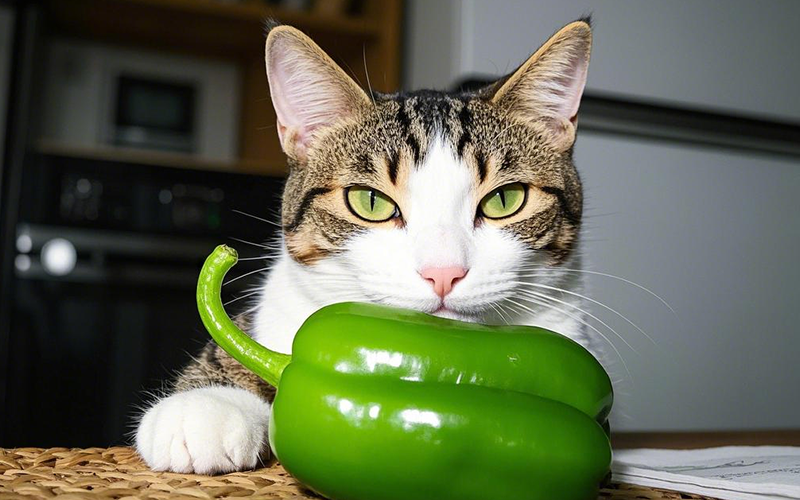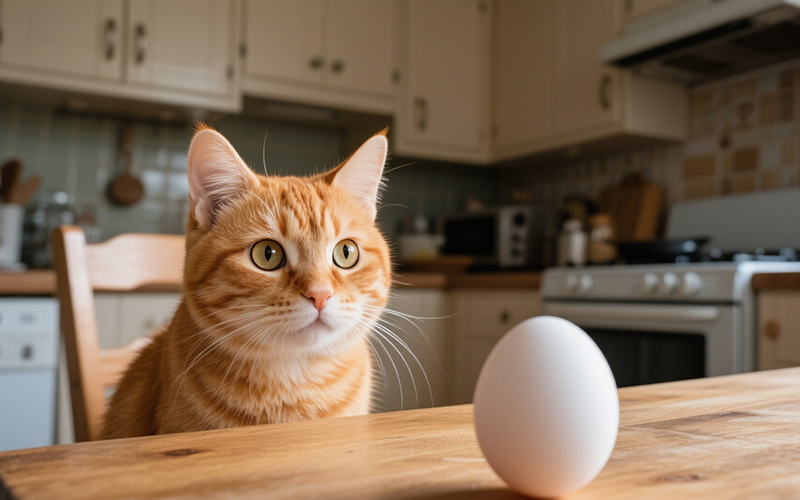Can Cats Eat Bell Peppers? A Guide to Safe Treats for Your Feline
- 4 Mar 2025 10:46
As a pet owner, you may wonder whether it’s safe to share some of your meals with your cat. One common question is: Can cats eat bell peppers? The short answer is yes, cats can eat bell peppers, but there are some important things to consider. While bell peppers aren’t toxic to cats, they don’t provide the essential nutrients that cats need in their diet.
In this article, we’ll discuss the safety of bell peppers for cats, the potential benefits, and how to serve them correctly.

Are Bell Peppers Safe for Cats?
✅ Yes, Bell Peppers Are Safe in Moderation
Bell peppers, especially red, green, yellow, and orange varieties, are non-toxic to cats. They don’t contain harmful chemicals or ingredients that are dangerous for felines. However, since cats are obligate carnivores (they require animal-based proteins), they don’t need vegetables like bell peppers in their diet.
That being said, bell peppers can still be a safe treat in small amounts, provided they are prepared correctly.
❌ Considerations Before Feeding Bell Peppers to Cats
Digestive Sensitivity
While bell peppers are safe for most cats, some may have a sensitive stomach and could experience gas, bloating, or diarrhea. It’s important to observe your cat’s reaction when offering bell peppers for the first time.Choking Hazard
Bell peppers should be cut into small pieces to avoid any risk of choking, especially for smaller cats. The skin can be tough, and large chunks could cause a problem if your cat tries to swallow them whole.Seeds and Stem
The seeds and stem of the bell pepper should be removed before offering them to your cat. While the seeds aren’t toxic, they can cause discomfort or digestive upset if ingested in large amounts.Seasoning and Additives
Always serve bell peppers plain, without any added seasoning, oils, or salt. Spices, garlic, and onions—common additions to bell pepper dishes—are harmful to cats. Always ensure the bell pepper is fresh and unseasoned.
Health Benefits of Bell Peppers for Cats
Although bell peppers aren’t a necessary part of your cat’s diet, they can offer some potential health benefits when given in moderation:
1. Rich in Vitamins
Bell peppers are high in vitamin C, which supports your cat’s immune system and helps keep their skin and coat healthy. They also contain vitamin A, which supports vision and immune health.
2. Antioxidants
Bell peppers contain antioxidants such as beta-carotene, which can help protect your cat’s body from free radical damage and support overall well-being.
3. Low in Calories
Bell peppers are low in calories, making them a healthy alternative to high-fat treats for overweight or less active cats. They’re also hydrating, which can be beneficial for cats that struggle with drinking enough water.
How to Safely Feed Bell Peppers to Your Cat
If you decide to feed your cat bell peppers, follow these simple tips to ensure they’re safe:
Choose Fresh Bell Peppers
Opt for fresh bell peppers and avoid those that are overripe or have begun to spoil. Remove any blemishes or soft spots before serving.Cut into Small Pieces
Cut the bell pepper into small, manageable pieces that are easy for your cat to chew and digest. Large chunks can be a choking hazard.Remove Seeds and Stem
Always remove the seeds and stem of the bell pepper before offering it to your cat. These parts of the vegetable are harder to digest and could cause discomfort.Serve Plain
Do not add any salt, oils, or spices to the bell peppers. Cats don’t need these seasonings, and some can be harmful to their health.Introduce Gradually
Start by offering only a small amount of bell pepper and observe your cat for any signs of digestive upset like vomiting or diarrhea. If your cat reacts negatively, stop feeding them bell peppers and consult a veterinarian if necessary.
Alternatives to Bell Peppers for Cats
While bell peppers can be a safe treat in moderation, there are other cat-safe vegetables and treats you can offer:
Carrots (cooked or raw) – Rich in fiber and vitamins.
Cucumber – Refreshing and hydrating.
Green beans – Low-calorie and good for digestion.
Pumpkin purée – Great for digestive health.
Commercial cat treats – Always formulated for feline nutrition.
Final Verdict: Can Cats Eat Bell Peppers?
✅ Yes, cats can eat bell peppers, but only in small amounts and plain, without any added seasoning or oils. While they provide benefits like vitamins and antioxidants, bell peppers are not necessary for a cat’s diet and should be offered as a treat, not a meal replacement.
⚠ If you choose to feed bell peppers to your cat, monitor them for any signs of digestive upset and be cautious about portion sizes.
💡 Need help with your cat’s diet or health concerns? Consider using PettureX, an AI-powered pet health assistant that offers 24/7 online consultations and image recognition to guide you in making the best choices for your pet. It’s a great tool to help ensure the safety of your cat’s food and overall health.
Have more questions about your cat’s diet or health? Feel free to ask! 🐱🌶️
Related

Can Cats Eat Egg Yolk Raw? A Vet's In-Depth Guide to Feline Nutrition & Safety
- 10 Jun 2025
Can Cats Eat Dog Kibble? Unpacking the Nutritional Mismatch!
- 29 May 2025
Can Cats Eat Deli Turkey? Slicing Through the Facts for Your Feline!
- 29 May 2025
Can Cats Eat Deer Meat? Exploring Venison for Your Feline!
- 28 May 2025
Can Cats Eat Corned Beef? Unpacking This Salty Human Delicacy!
- 28 May 2025
Can Cats Eat Cooked Rice? The Grain Truth for Your Feline Friend!
- 27 May 2025
Can Cats Eat Cornbread? A Crumb of Truth for Curious Cat Owners!
- 27 May 2025
Can Cats Eat Cooked Meat? Sizzling Facts for Your Feline's Feast!
- 26 May 2025
Can Cats Eat Chili? Spicing Up the Truth About This Human Dish!
- 26 May 2025
Can Cats Eat Chicken Eggs? Cracking the Code on This Feline Food Query!
- 24 May 2025
